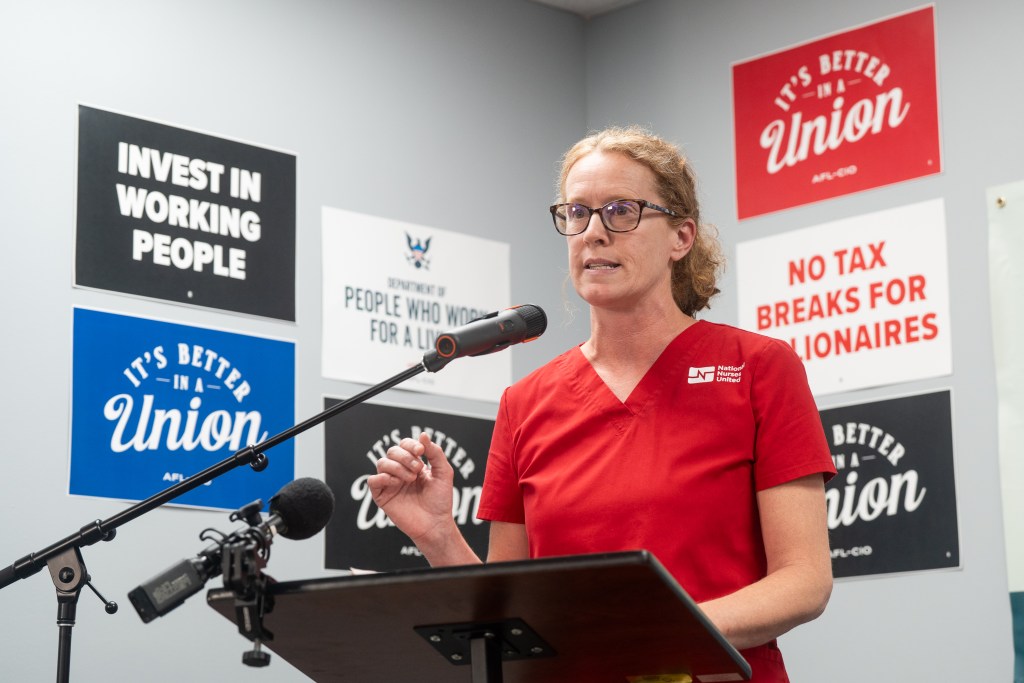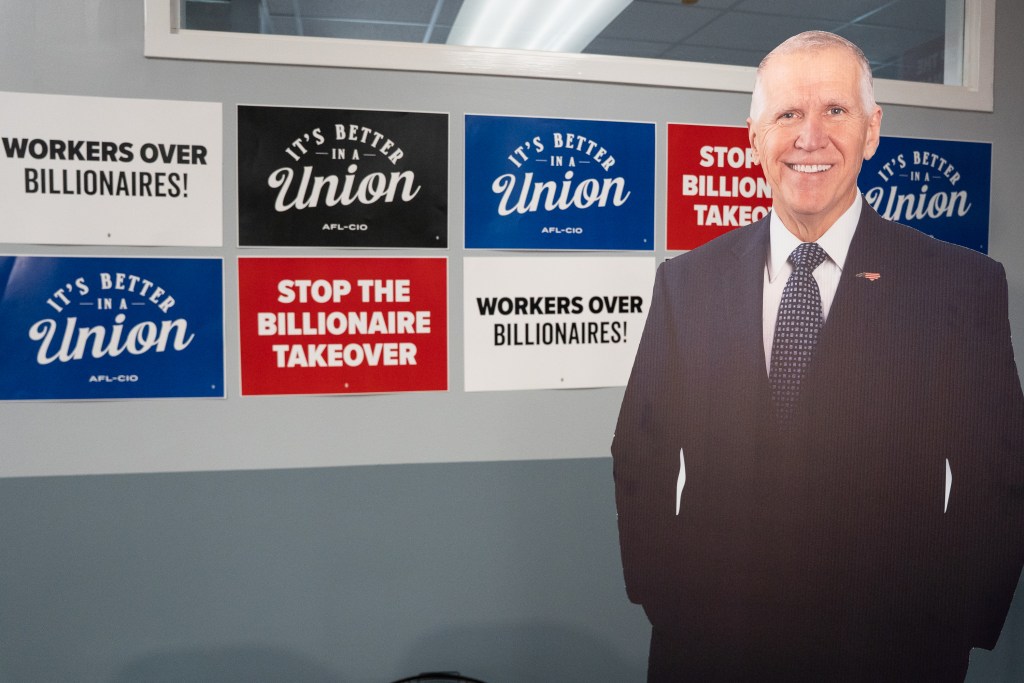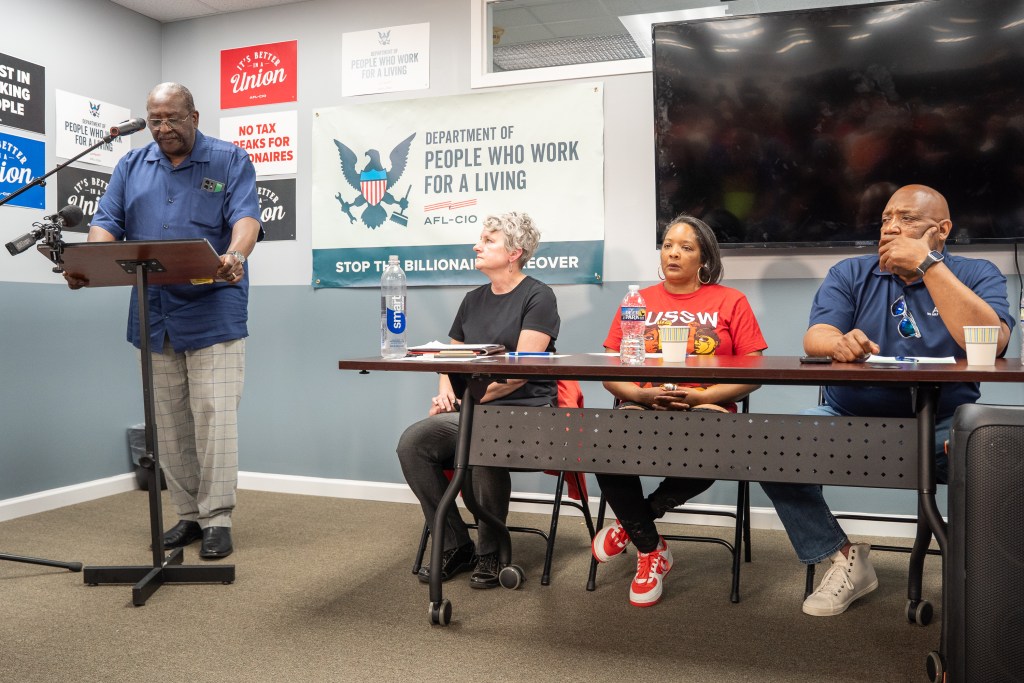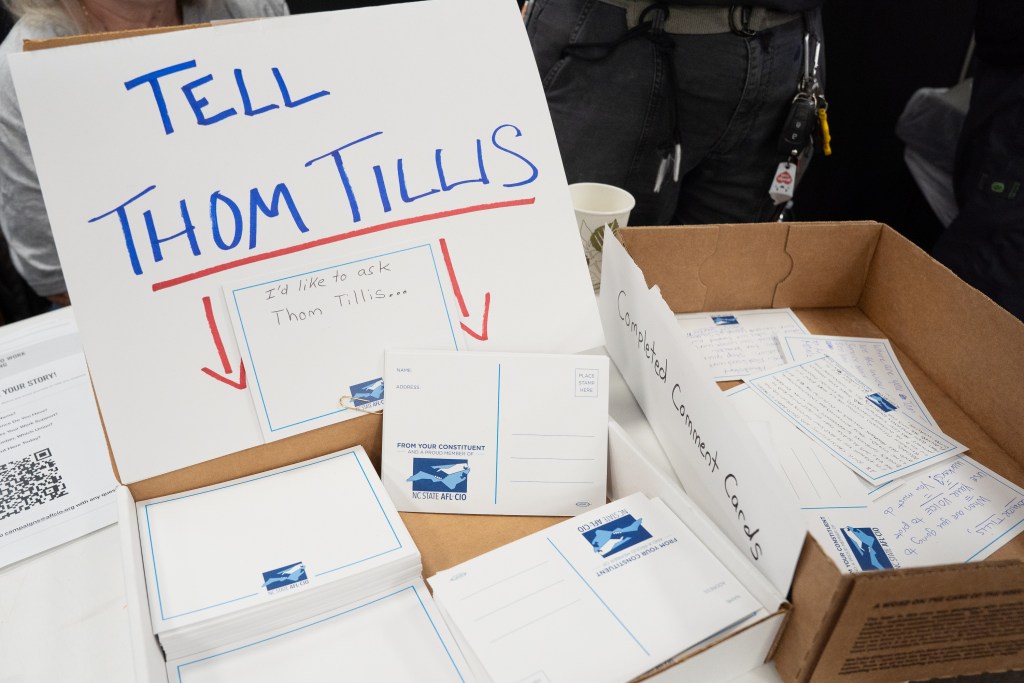Senator Thom Tillis was invited to hear testimony from federal workers affected by recent government cuts Tuesday evening but didn’t bite, so instead, a life-sized cardboard cutout of the Republican senator was erected inside a windowless meeting room on the first floor of an M&F Bank in Durham.
“Turn to him and address him with your question like he’s really here,” an organizer quietly instructed speakers as they prepared to deliver remarks.
The event—organized by the satirically named “Department of People Who Work for a Living,” a movement that the AFL-CIO formed in response to Elon Musk’s DOGE initiative—brought together more than 100 federal employees, union members, and supporters to document the human cost of sweeping federal cuts hitting North Carolina. The testimonies and stories collected at the event and others nationwide will be compiled into a report for elected officials in Washington.
Before Trump took office in January, North Carolina had nearly 85,000 federal workers, with about 18 percent located in the Triangle. In the months since, hundreds of Triangle residents, many of whom worked in foreign aid, medical research, and environmental science, have lost their jobs. Layoffs at the EPA’s Research Triangle Park campus—the agency’s largest facility—are well underway. At the Office of Research and Development, staff reductions of up to a whopping 75 percent are expected.
“Morale is the lowest it’s ever been,” said Holly Wilson, an EPA employee of 27 years who leads the union representing RTP EPA workers. “I’ve seen tears in the hallway.”
At Durham’s VA hospital, contracts for patient care equipment and services have been terminated, meaning that nurses like Libby Manly, who took the microphone in a shirt that read “Safe staffing saves lives,” have been passing out meal trays and stocking supply rooms instead of caring for patients at the bedside.
Doctors, Manly said, have been conducting telehealth visits “from broom closets and broken elevators.”
“Our opponents, driven by greed and corruption, want to break the VA so that they can take it away from you, from me, and from our veteran patients,” Manly said. “Billionaires and their political allies only see the hundreds of millions of dollars in profit that they can make off the backs of our veteran patients by privatizing the VA. That’s what they want to do.”

Research programs at the VA—which we have to thank for the first cardiac pacemaker, the shingles vaccine, and treatments for tuberculosis—are also being dismantled. Julie Holcomb, a Navy veteran who until recently coordinated a PTSD treatment study at the Durham VA, said she was forced to resign this month when return-to-office mandates collided with a hiring freeze that prevented her from moving to a remote or part-time role.
Holcomb’s project included research data from nearly 100 veterans that cost millions of dollars to collect. Now, she said, none of it will be entered, analyzed or published.
“Senator Tillis, do you support medical research for veterans? And if so, what do you plan to do to protect it?” Holcomb asked the cardboard cutout.

As speakers took turns, attendees filled every available seat and squeezed along walls. At one point, members of the Union of Southern Social Workers, in one section of the room, dressed in red, began chanting—“When union rights are under attack, what do we do? Stand up, fight back”—and a small child sitting on the lap of a woman wearing a gray T-shirt with “Your vote matters” printed across it recoiled.
“I don’t want to fight,” the child said.
A man sitting in front of them turned around. “It’s a different kind of fight, sweetheart,” he said. “It’s not a physical fight. It’s a fight where you use your eyes and your mind.”
That man was Wayne Bostick, president of the North Carolina A. Philip Randolph Institute, a civil rights nonprofit, who took the mic to speak on the growing food insecurity crisis in North Carolina due to massive funding cuts.
“I was going to do a food drive at the end of May. I just learned the food bank is going to be closed that week,” Bostick said. “That’s never happened, never.”

Throughout the evening, speakers directed their ire almost exclusively at Tillis and did not make mention of North Carolina’s junior senator, Ted Budd, despite Budd’s similarly lackluster response to federal cuts. When asked afterward about this focus, Jeremy Sprinkle, communications director for the North Carolina State AFL-CIO, said that “Tillis happens to be up for re-election next year, and this is the only moment that we have to stop this train wreck from happening.”
The event also focused more on Musk and DOGE than on Trump. The president’s name was only dropped once, by Manly: “My question for Senator Tillis: were you born with no spine? Or is this a Trump-related medical condition?”

This story is part of an INDY series looking at the impacts of federal funding cuts on the lives of Triangle residents.
Support independent local journalism. Join the INDY Press Club to help us keep fearless watchdog reporting and essential arts and culture coverage viable in the Triangle.
Reach Staff Writer Lena Geller at [email protected].Comment on this story at [email protected]
